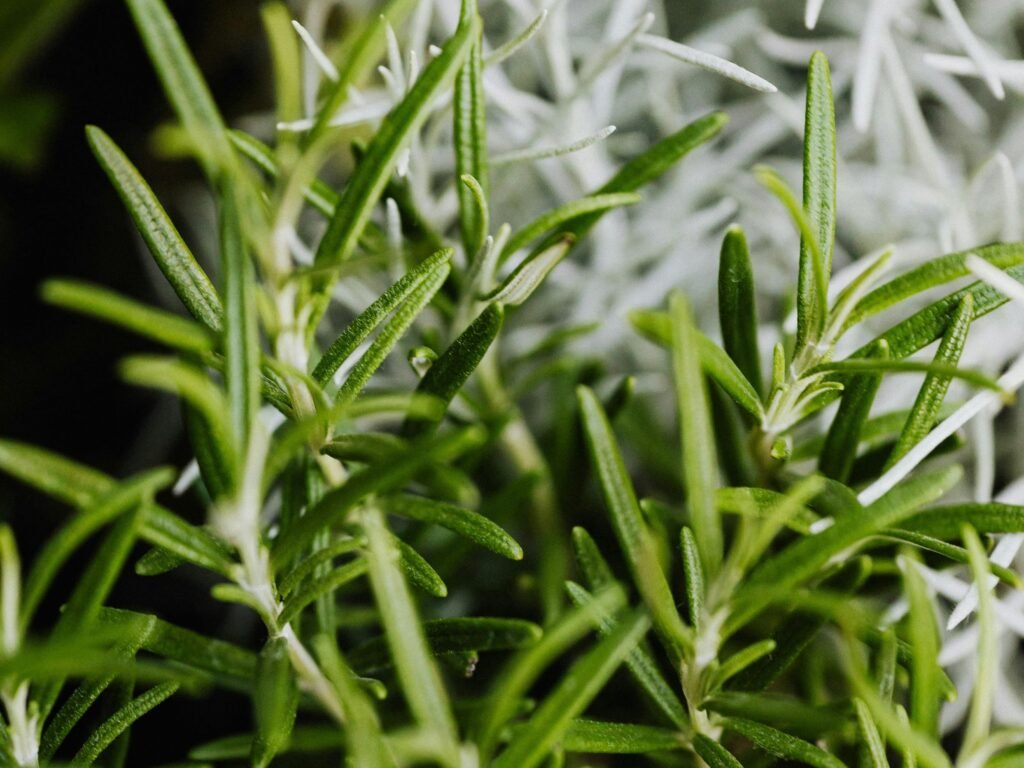Table of Contents
Nestled among the fragrant herbs of the Mediterranean, rosemary has captivated hearts and minds for centuries with its aromatic allure and medicinal prowess. In this journey, we delve into rosemary’s nutritional richness and therapeutic potential, uncovering its profound impact on health and vitality. From its antioxidant properties to its role in cognitive function and beyond, rosemary offers many reasons to incorporate it into your daily routine. Join us as we unravel the secrets of rosemary and discover how this humble herb can elevate both your culinary creations and your well-being.
Rosemary, scientifically known as Rosmarinus officinalis, traces its origins to the Mediterranean region, where it has flourished for millennia. Belonging to the mint family, Lamiaceae, rosemary is native to the rocky hillsides and coastal regions of the Mediterranean basin, including countries like Greece, Italy, and Spain. Its name “rosemary” is derived from the Latin words “ros” (dew) and “marinus” (sea), reflecting its preference for coastal habitats and the dew-like appearance of its aromatic leaves. Revered in ancient cultures for its aromatic fragrance, culinary versatility, and medicinal properties, rosemary has been cherished throughout history.
Today, rosemary is cultivated worldwide for its culinary uses, ornamental value, and potential health benefits, embodying a rich botanical legacy that spans continents and centuries.
NUTRITIONAL VALUE

Rosemary, revered for its culinary and medicinal properties, offers a modest yet noteworthy nutritional profile. While primarily consumed in small quantities as a culinary herb, rosemary provides essential vitamins, minerals, and antioxidants. A 100-gram serving of fresh rosemary leaves contains approximately 131 calories. It is a rich source of vitamin C, vitamin A, and vitamin K. Additionally, rosemary boasts minerals such as calcium, iron, and manganese, which contribute to bone health and enzyme function. Beyond its macronutrient content, rosemary is renowned for its volatile oils, including cineole, camphor, and rosmarinic acid, which imbue the herb with its distinctive aroma and potential health benefits.
These bioactive compounds exhibit antioxidant, anti-inflammatory, and antimicrobial properties, making rosemary a valuable addition to culinary dishes and herbal remedies alike, promoting overall health and well-being.
HEALTH BENEFITS

Rosemary offers a plethora of health benefits, thanks to its rich array of bioactive compounds and medicinal properties.
ANTIOXIDANT PROPERTIES
Rosemary is rich in antioxidants, including phenolic compounds such as rosmarinic acid and carnosic acid. These antioxidants help neutralize harmful free radicals, protecting cells from oxidative damage and reducing the risk of chronic diseases such as cancer, heart disease, and neurodegenerative disorders like Alzheimer’s disease.
ANTI-INFLAMMATORY EFFECTS
Rosemary contains compounds like rosmarinic acid and carnosol, which possess anti-inflammatory properties. These compounds help reduce inflammation in the body, potentially alleviating symptoms of inflammatory conditions such as arthritis, asthma, and inflammatory bowel disease.
IMPROVED DIGESTIVE HEALTH
Rosemary has been traditionally used to aid digestion and soothe gastrointestinal discomfort. It may help stimulate the production of digestive enzymes, promoting efficient digestion and nutrient absorption. Rosemary tea or extracts may also help relieve symptoms of indigestion, bloating, and gas.
ENHANCED COGNITIVE FUNCTION
Some research suggests that rosemary may have cognitive-enhancing effects, particularly regarding memory and concentration. Inhalation of rosemary essential oil or consumption of rosemary extract may help improve cognitive performance and mental alertness, making it a potential aid for students and those experiencing age-related cognitive decline.
POTENTIAL CANCER PREVENTION
Several studies have investigated the anticancer properties of rosemary and its constituents. Compounds like carnosic acid and rosmarinic acid have demonstrated anti-tumour effects in laboratory studies, showing promise in preventing the growth and spread of cancer cells. While more research is needed, incorporating rosemary into the diet may contribute to cancer prevention strategies.
HEART HEALTH SUPPORT
Rosemary may help promote heart health by reducing risk factors for cardiovascular disease. Its antioxidant and anti-inflammatory properties may help lower blood pressure, reduce LDL cholesterol levels, and improve blood vessel function, thereby reducing the risk of heart disease and stroke.
ANTIMICROBIAL ACTIVITY
Rosemary contains volatile oils with antimicrobial properties, making it effective against various bacteria, fungi, and viruses. These antimicrobial properties may help prevent infections and support immune function, contributing to overall health and well-being.
SKIN AND HAIR HEALTH
Rosemary oil is often used topically in skincare and haircare products due to its antimicrobial and anti-inflammatory properties. It may help treat acne, soothe skin irritations, and promote hair growth by improving circulation to the scalp and stimulating hair follicles.
PAIN RELIEF
Rosemary has been used traditionally to alleviate pain and inflammation associated with conditions like arthritis and muscle soreness. Its analgesic properties may help reduce pain sensations and improve mobility, providing relief for those experiencing discomfort.
RESPIRATORY SUPPORT
Inhalation of rosemary essential oil may help relieve respiratory symptoms such as congestion, cough, and sinusitis. Its expectorant properties may help loosen mucus and phlegm, making it easier to expel from the respiratory tract.
PRECAUTIONS

While rosemary offers numerous health benefits, it’s essential to be aware of potential precautions and drawbacks associated with its consumption and use:
ALLERGIC REACTIONS
Some individuals may be allergic to rosemary or develop allergic reactions upon exposure. Symptoms of rosemary allergy may include skin rash, itching, swelling, or difficulty breathing. If you have known allergies to other plants in the Lamiaceae family, such as mint or sage, you may be more likely to experience allergic reactions to rosemary.
PREGNANCY AND BREASTFEEDING
While rosemary is generally considered safe for culinary use during pregnancy, there is limited research on its safety in medicinal doses or concentrated forms such as essential oil. Pregnant or breastfeeding women should exercise caution and moderate their consumption of rosemary, particularly rosemary supplements or essential oil, to avoid potential adverse effects. High doses of rosemary may stimulate uterine contractions and could potentially lead to miscarriage or premature labour.
DRUG INTERACTIONS
Rosemary contains compounds that may interact with certain medications. For example, rosemary may interfere with blood clotting and could interact with anticoagulant medications such as warfarin. Additionally, rosemary may affect blood sugar levels and could interact with diabetes medications. If you are taking medication, especially blood thinners or diabetes medication, consult with your healthcare provider before consuming rosemary or rosemary supplements.
GASTROINTESTINAL IRRITATION
In some individuals, high doses of rosemary or concentrated forms such as essential oil may cause gastrointestinal irritation, leading to symptoms such as nausea, vomiting, or diarrhoea. It’s essential to use rosemary in moderation and avoid excessive consumption, particularly in sensitive individuals or those with gastrointestinal conditions such as gastritis or peptic ulcer disease.
SEIZURES
There is some concern that high doses of rosemary or rosemary essential oil may trigger seizures in susceptible individuals, particularly those with epilepsy or a history of seizures. Rosemary contains camphor, a compound that can stimulate the central nervous system and may lower the seizure threshold in some people. If you have a seizure disorder or are prone to seizures, it’s essential to use rosemary cautiously and consult with a healthcare professional before using rosemary supplements or essential oils.
SKIN SENSITIVITY
Rosemary essential oil is potent and may cause skin irritation or allergic reactions in some individuals, particularly when used undiluted or in high concentrations. It’s essential to dilute rosemary essential oil properly before applying it to the skin and perform a patch test to check for sensitivity. Discontinue use if you experience any adverse reactions such as redness, itching, or burning sensation.
LIVER HEALTH
Some animal studies have suggested that high doses of rosemary extract may have hepatotoxic effects and could potentially cause liver damage. While these findings are not conclusive, individuals with liver disease or impaired liver function should use rosemary cautiously and consult with a healthcare professional before using rosemary supplements or extracts.
INCORPORATING ROSEMARY INTO YOUR DIET

Incorporating rosemary into your diet is not only a flavourful way to enhance your culinary creations but also an opportunity to potentially reap its health benefits. Here are several creative ways to use rosemary in your cooking:
- Herb-Roasted Meats: Rosemary pairs exceptionally well with meats like chicken, lamb, pork, and beef. Simply sprinkle fresh rosemary leaves or minced rosemary over the meat before roasting or grilling. The aromatic flavour of rosemary infuses the meat, adding depth and complexity to the dish.
- Infused Oils and Vinegar: Create your own rosemary-infused oils and vinegar to add a burst of flavour to dressings, marinades, and sauces. Place fresh rosemary sprigs in a bottle of olive oil or vinegar and let them infuse for several days to a week. Strain out the rosemary before using the infused oil or vinegar in your recipes.
- Homemade Bread and Rolls: Add chopped fresh rosemary or dried rosemary to homemade bread or rolls for a fragrant and savoury twist. Rosemary bread pairs well with soups, salads, and pasta dishes, adding a delightful aroma and flavour to every bite.
- Potatoes and Root Vegetables: Rosemary complements the earthy flavours of potatoes, sweet potatoes, and other root vegetables. Toss chopped rosemary with olive oil, salt, and pepper, then roast the vegetables until tender and golden brown. The caramelized edges of the vegetables and the aromatic rosemary create a delicious side dish.
- Herb Butter: Make your herb butter by mixing softened butter with finely chopped rosemary leaves, garlic, and a pinch of salt. Spread the herb butter on crusty bread, melt it over steamed vegetables, or use it to baste grilled meats for extra flavour.
- Homemade Pasta Sauces: Add depth of flavour to homemade pasta sauces by incorporating rosemary. Simmer fresh or dried rosemary leaves in tomato sauce, Alfredo sauce, or pesto sauce for a savoury and aromatic touch. Remove the rosemary sprigs before serving the sauce over pasta.
- Flavoured Salts and Rubs: Create your flavoured salts and rubs by combining salt with dried rosemary and other herbs and spices. Use rosemary-infused salt to season meats, vegetables, and roasted nuts, or use it as a finishing touch on dishes for added flavour.
- Herbal Teas and Infusions: Enjoy the soothing properties of rosemary by brewing it into herbal teas and infusions. Steep fresh or dried rosemary leaves in hot water for several minutes to create a fragrant and invigorating tea. You can also combine rosemary with other herbs like mint, lemon balm, or ginger for unique flavour combinations.
In conclusion, rosemary stands as a remarkable herb not only for its culinary versatility but also for its potential health benefits. From its antioxidant-rich profile to its anti-inflammatory properties and beyond, rosemary offers many reasons to incorporate it into your diet and lifestyle. However, while rosemary has been used traditionally for its medicinal properties, it’s essential to use it in moderation and be mindful of potential interactions or sensitivities, particularly with concentrated forms like essential oil or supplements.
By harnessing the power of rosemary in your culinary creations, herbal remedies, and self-care routines, you can savour its aromatic flavour while potentially promoting your overall health and well-being. Let rosemary become not just a staple in your kitchen, but also a cherished ally in your journey toward optimal health and vitality.

